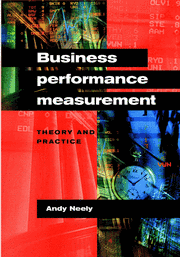Book contents
- Frontmatter
- Contents
- List of contributors
- Preface
- Part I Performance measurement – functional analyses
- Part II Performance measurement – theoretical foundations
- 5 A conceptual and operational delineation of performance
- 6 When it should not work but does: Anomalies of high performance
- 7 Does pay for performance really motivate employees?
- 8 Superior managers tolerance to dysfunctional behavior: A test
- Part III Performance measurement – frameworks and methodologies
- Part IV Performance measurement – practical applications
- Part V Performance measurement – specific measures
- Part VI Performance measurement – emerging issues and trends
- Index
5 - A conceptual and operational delineation of performance
from Part II - Performance measurement – theoretical foundations
Published online by Cambridge University Press: 06 July 2010
- Frontmatter
- Contents
- List of contributors
- Preface
- Part I Performance measurement – functional analyses
- Part II Performance measurement – theoretical foundations
- 5 A conceptual and operational delineation of performance
- 6 When it should not work but does: Anomalies of high performance
- 7 Does pay for performance really motivate employees?
- 8 Superior managers tolerance to dysfunctional behavior: A test
- Part III Performance measurement – frameworks and methodologies
- Part IV Performance measurement – practical applications
- Part V Performance measurement – specific measures
- Part VI Performance measurement – emerging issues and trends
- Index
Summary
Introduction
In this contribution the questions of what performance is and how to create it are addressed. A series of nine propositions that, taken together, provide an answer to the questions are developed.
After a brief overview of the reasons that led to this questioning and a review of the relevant literature that shows the extent of diversity of meanings, the authors develop step by step the process that leads to performance, showing it to be a social construct which results from the identification and the sharing of a causal model. That observation leads to the conclusion that performance is meaningful only within a decision-making context. The concept of performance is, therefore, specific to a given set of decision makers. Creating alignment between decision makers both inside and outside the firm is a prerequisite for performance to occur.
In the last sections of the contribution, the impact of responsibility assignment and of measurement on the operational definition of performance are shown. All in all the nine propositions form the basis on which performance can be defined, identified, measured, and managed.
Background
In the Fall of 1995, the French Conseil National de la Comptabilité1 organized committees to revise the 1982 Plan Comptable Général. As part of the revision of the whole text, 2 the charge of the Comptabilité de Gestion (Management Accounting) Committee was to update the third part (Title III)) of the Plan that dealt with management accounting. Although the Title III is not compulsory, unlike the first two parts, it was felt that the field of management accounting had sufficiently evolved to deserve a radical update.
- Type
- Chapter
- Information
- Business Performance MeasurementTheory and Practice, pp. 65 - 79Publisher: Cambridge University PressPrint publication year: 2002
- 47
- Cited by



